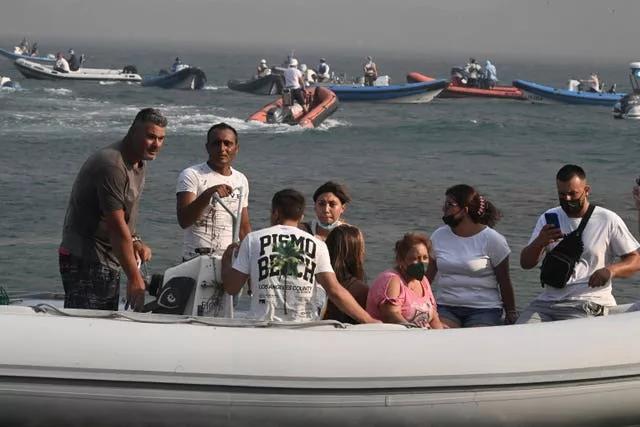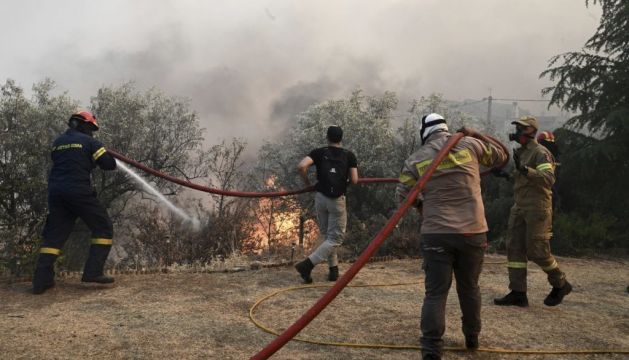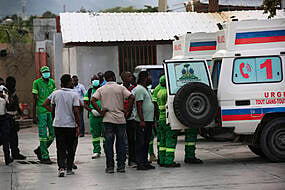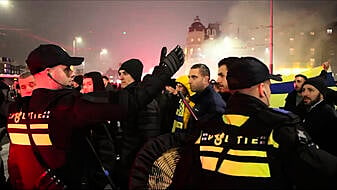A wildfire has triggered a series of massive explosions at an air force ammunition depot in central Greece and F-16 fighter jets are being moved from a nearby air base while firefighters work to tame multiple blazes in the country.
The depot was evacuated before the explosions, and no injuries were reported, although continued blasts prevented firefighting teams from approaching the site.
Fires have raged across parts of Greece during three successive Mediterranean heatwaves in the past two weeks, leaving five people dead, including two firefighting pilots, and triggering a huge weekend evacuation of tourists on the island of Rhodes.
The fire in the Volos area of central Greece’s Magnissia region reached the ammunition storage facility about four miles north of the major military air base in Nea Anchialos. Local media reported that bombs and ammunition for Greek F-16 fighters were stored at the site.
The large explosions shattered windows of houses in the surrounding area but the Greek fire service said no injuries were reported in nearby villages, which also were evacuated as a precaution.
Fire Service spokesman Ioannis Artopios said 12 villages were ordered to be evacuated in the Volos-Nea Anchialos area.
“Despite their superhuman efforts, our forces were unable to stop the blaze,” he said.
Mr Artopios said the Volos area blaze was the most dangerous of the 124 wildfires the fire service had to deal with on Thursday.
The wildfire burned on three fronts and forced a section of Greece’s busiest highway to close for several hours while national rail services passing through the area were delayed.

State ERT television showed residents and visitors in the coastal village of Anchialos, close to the blast site, being evacuated by sea while others were leaving in cars and buses.
The mayor of the city of Volos, Achilleas Beos, appealed to all remaining village residents to obey the evacuation order, saying some 80% had left. The coastguard said dozens of residents were taken in small private boats to the city of Volos.
The Nea Anchialos air base is 12 miles from the city, where the blasts were heard loudly. The air force said that while the facility was not immediately threatened, some of the F-16 fighters based there were taking off for other air bases as a precaution.
Water-dropping helicopters and a ground crew scrambled early on Thursday to a separate wildfire in Kifissia, just north of Athens, which was quickly put out.
Greek firefighters also battled flames for a 10th successive day on Rhodes, where officials said the blazes were largely contained. Flare-ups were reported on the island of Evia.

The World Meteorological Organisation, a U.N. body and a European Union climate change service reported on Thursday that temperatures during the first three weeks of July set a new global heat record.
As southern Europe fights extreme heat and wildfires, parts of central Europe have been hit with winter conditions. Sub-freezing temperatures, frost and snow have been reported in the Tatra Mountains, which run through Poland and Slovakia.
In Italy, firefighters battled brush fires in the southern mainland regions of Calabria and Puglia, as well as the islands of Sicily and Sardinia, helped by temperatures dropping some into the low and mid-30s.
Sicily remained the focal point, with fires continuing to burn near the capital, Palermo.
“Without doubt, we can see that all across the Mediterranean the climate crisis is here, and it’s affecting us all more strongly than perhaps even scientists had warned us about,” Greek prime minister Kyriakos Mitsotakis said on Thursday during a meeting with Greece’s president, Katerina Sakellaropoulou.







